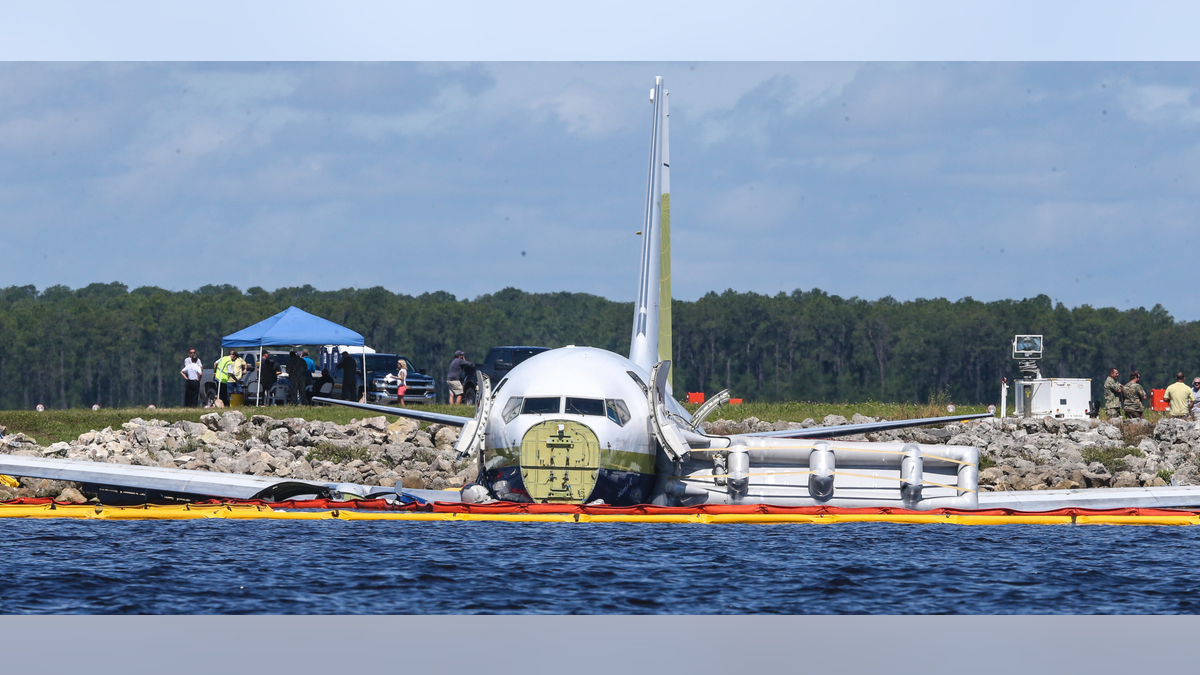
A charter plane carrying 143 people and traveling from Cuba to north Florida sits in a river at the end of a runway, Saturday, May 4, 2019 in Jacksonville, Fla. The Boeing 737 arriving at Naval Air Station Jacksonville from Naval Station Guantanamo Bay, Cuba, with 136 passengers and seven aircrew slid off the runway Friday night into the St. Johns River, a NAS Jacksonville news release said. (AP Photo/Gary McCullough)
JACKSONVILLE, Fla. – A chartered jet carrying 143 people from the U.S. military base in Cuba tried to land in a thunderstorm and ended up in the river at Naval Air Station Jacksonville. Authorities said everyone on board emerged without critical injuries, lining up on the wings and waiting to be rescued.
The Boeing 737 landed in north Florida from Naval Station Guantanamo Bay, Cuba, Friday night, with 136 passengers and seven crew members coming to a stop in shallow water in the St. Johns River. Everyone on board was alive and accounted for, but nearly two dozen people were transported to local hospitals. Most have since been released, authorities said.
Marine units from the Jacksonville's Sheriff's Department and Fire Rescue joined first responders from the naval air station, helping passengers and crew to safety.
Capt. Michael Connor, the commanding officer of NAS Jacksonville, described the passengers as a mix of military personnel and families, and a few civilians. While some were staying in the area, others planned to fly on to other parts of the country.
"I think it is a miracle," Connor said. "We could be talking about a different story this evening."
Passengers lined up on the plane's wings before climbing into rescue boats, said the base's fire chief, Mark Brusoe.
Several pets were on the plane as well, and their status wasn't immediately clear. A navy statement early Saturday offering "hearts and prayers" to their owners said safety issues prevented rescuers from immediately retrieving the animals.
It wasn't immediately clear what went wrong. Boeing said in a tweet Friday night that it was investigating: "We are aware of an incident in Jacksonville, Fla., and are gathering information." The Federal Aviation Administration was referring media inquiries to NAS Jacksonville. The National Transportation Safety Board dispatched a team of 16 investigators to determine what happened.
Connor said he didn't know what impact the weather had on the flight. "I was at home when this happened and there were thunderstorms and lightning," he said.
The flight was a regular charter run by Miami Air International, which has many military contracts, including weekly flights between the U.S. base in Cuba and the Jacksonville air station as well as Andrews Air Force Base in Maryland. The company didn't immediately respond to messages from The Associated Press.
The same plane had been expected to return to Cuba on Saturday to carry other members of the military, lawyers and others to Andrews after this week's military commission hearings of people charged with war crimes. The U.S. still holds 40 men at the detention center in Guantanamo Bay, including five charged with planning and aiding the Sept. 11, 2001 terror attacks.
It wasn't known how long it would take to remove the plane from the river, but Connor said the landing gear appeared to be resting on the river bed, making it unlikely for the aircraft to float away. He said crews began working to contain any jet fuel leaks almost immediately after securing the passengers' safety.
The chemical smell of fuel and oil was pungent as AP journalists took a boat for a closer look. The bottom of the plane was under water, making it difficult to access the cargo hold, and the plane's nose cone was missing.
"We're obviously very concerned about the environment and we're doing everything we can to contain it," Connor said about the fuel. "Once we were assured that personnel were safe, our next priority effort was to ... contain any type of fuel."
Jacksonville Fire and Rescue tweeted that approximately 90 personnel responded to the scene, and that the department's special operations team had just trained with marine units for a similar incident earlier Friday.
___
Schneider reported from Orlando. Other Associated Press contributors include Ben Fox in Washington and David Fischer in Miami.
___
This story has been corrected. The surname of the air station's fire chief is Brusoe, not Bruce.
